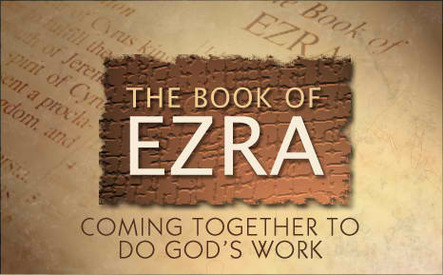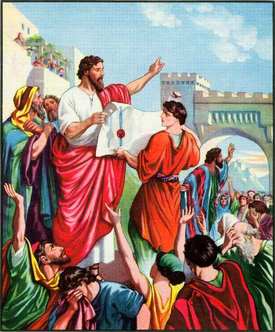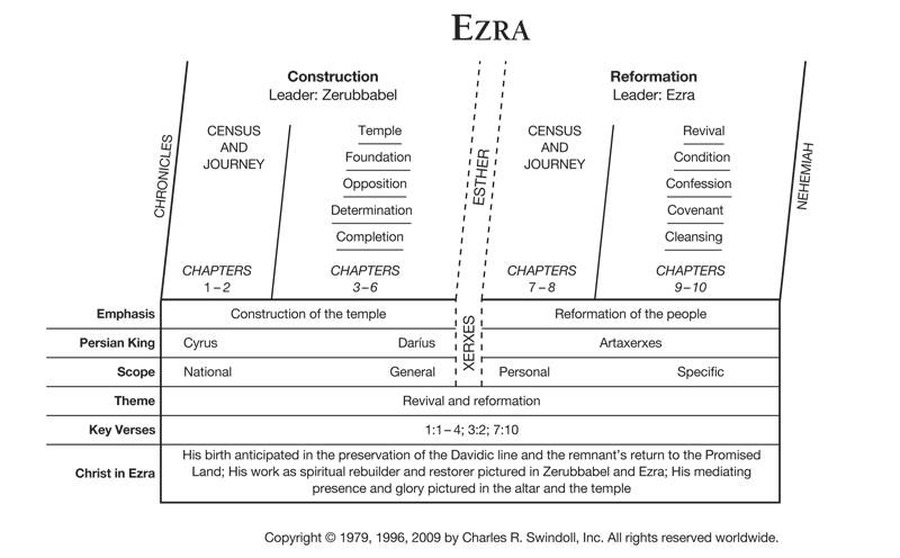The Book of Ezra

The books of Ezra and Nehemiah were one in the earliest Hebrew manuscripts. Origen is the first writer known to distinguish between two books, which he called I Ezra and II Ezra. Although they were regarded as one book, the caption to Nehemiah 1:1 indicates they were two separate compositions. The author of Ezra is not known for certian. Ezra tells about the return of the Jews from exile in Babylon and also of the rebuilding of the temple. The people completed and dedicated the temple in 516 B.C. after being delayed for eighteen years by their enemies from the north. A decree from Darius in 520 B.C. allowed them to finish. Ezra taught the people the law and reformed their religious life so the other nations around them could see they were God's chosen nation.

In Chapters 1-6, a relatively small number of Jews return to the city of Jerusalem and immediately prepare to construct the new temple. They began the planning, the gathering of materials, and then begin the construction. The building drags on because the surrounding enemies begin oppressing and frightening them. Eighteen years later, it is completed. “The sons of Israel
who returned from exile and all those who had separated themselves from the impurity of the nations of the land to join them, to seek the LORD God of Israel, ate the Passover. And they observed the Feast of Unleavened Bread seven
days with joy, for the LORD had caused them to rejoice, and had turned the heart of the king of Assyria toward them to encourage them in the work of the house of God, the God of Israel” (6:21-22).
From chapters 7-10, the second group of Jews returns to Israel. Ezra is
included in this return. He teaches the Law, but has problems with
intermarriage and addresses the pagan women who brought their religious practices with them. “For Ezra had set his heart to study the law of the LORD and to practice it, and to teach His statutes and ordinances in Israel” (7:10).
who returned from exile and all those who had separated themselves from the impurity of the nations of the land to join them, to seek the LORD God of Israel, ate the Passover. And they observed the Feast of Unleavened Bread seven
days with joy, for the LORD had caused them to rejoice, and had turned the heart of the king of Assyria toward them to encourage them in the work of the house of God, the God of Israel” (6:21-22).
From chapters 7-10, the second group of Jews returns to Israel. Ezra is
included in this return. He teaches the Law, but has problems with
intermarriage and addresses the pagan women who brought their religious practices with them. “For Ezra had set his heart to study the law of the LORD and to practice it, and to teach His statutes and ordinances in Israel” (7:10).

Foreshadowing of Jesus
We see in the Book of Ezra a continuation of the biblical theme of the
remnant. Whenever disaster or judgment falls, God always saves a tiny
remnant for Himself—Noah and his family from the destruction of the flood; Lot’s family from Sodom and Gomorrah; the 7000 prophets reserved in Israel despite the persecution of Ahab and Jezebel. When the Israelites were taken into captivity in Egypt, God delivered His remnant and took them to the Promised Land. Some fifty thousand people return to the land of Judea in Ezra 2:64-67, and yet, as they compare themselves with the numbers in Israel during its prosperous days under King David, their comment is, “We are left this day as a remnant.”
The remnant theme is carried into the New Testament where Paul tells us
that “at the present time there is a remnant chosen by grace” (Romans
11:5). Although most people of Jesus’ day rejected Him, there remained a set of people whom God had reserved and preserved in his Son, and in the covenant of His grace. Throughout all generations since Christ, there is the remnant of the faithful whose feet are on the narrow road that leads to eternal life (Matthew 7:13-14). This remnant will be preserved through the power of the Holy Spirit who has sealed them and who will deliver them safely at the last day (2 Corinthians 1:22; Ephesians 4:30).
continue to Nehemiah...